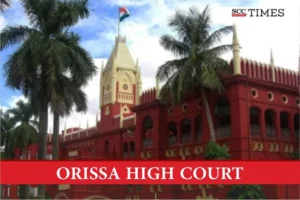Orissa High Court: In a civil writ petition, the Division Bench of Chakradhari Sharan Singh, CJ., and S.K. Sahoo*, J. answered the issue that whether excess payment made in favour of an employee can be recovered from his leave encashment benefits after his retirement, in negative.
Factual Matrix
The respondent joined as a Mail man on 17-01-1984. The Department of Personnel and Training, Government of India vide its letter dated 19-05-2009 recommended financial upgradation under a scheme named as ‘Modified Assured Career Progression Scheme’ (‘MACP’). The respondent was entitled to get the benefits of 3rd MACP upon completion of 30 years of service from his initial entry grade, i.e. 17-01-2014, however, it was pointed out by the internal audit report that he was erroneously granted 3rd MACP vide office order dated 21-04-2010. Subsequently, the respondent retired from service on 31-07-2017, but his leave encashment benefits were withheld for recovery of excess amount paid to him under the 3rd MACP.
The respondent filed an application before the Central Administrative Tribunal, Cuttack (‘Tribunal’) seeking disbursement of the leave encashment benefit with 18 per cent interest. The Tribunal vide order dated 14-10-2020 held that no order was passed by the petitioner Authority on which such an amount could have been recovered from the leave encashment entitlement of the respondent. The Tribunal directed the petitioner-Authority to disburse the amount of Rs. 3,88,548/- to the respondent along with interest on such amount from 01-8-2017 till the actual date of disbursement to the applicant at the rate of 9 per cent per annum.
Decision
Whether the petitioners could have recovered the excess payment made to the respondent from his leave encashment benefit?
The Court perused the Rule 39(2) of the Central Civil Services (Leave) Rules, 1972 (‘the Rules, 1972’) and said that the competent authority is authorized to withhold either whole or a part of cash equivalent of earned leave of a Government servant who retires from service while under suspension or while disciplinary or criminal proceedings are pending against him.
In the matter at hand, the Court said that the petitioner-Authority failed to produce any material to show that the respondent was under suspension, or that he was facing any disciplinary or criminal proceeding as on 31-07-2017, i.e. on the date of his retirement. Therefore, none of the above pre-conditions were satisfied, which could have empowered the authorities to withhold the encashment of earned leaves by the respondent. Further, the Court said that the petitioner-Authority did not produce any order by virtue of which recovery of the excess amount which was wrongly sanctioned to the respondent towards 3rd MACP benefit was done. Hence, the Court said that the petitioner-Authority was at fault for not passing an order in accordance with law for effectuating the deduction from the leave encashment benefits. The Court referred to State of Jharkhand v. Jitendra Kumar Srivastava, (2013) 12 SCC 210, wherein it was held that withholding or taking away a part of the leave encashment without the statutory mandate cannot be upheld.
The Court stated that it is no more res integra that the Government cannot be allowed to recover excess payment of allowances if the said payment was made by the employer by applying a wrong principle for calculating the pay or on the basis of erroneous interpretation of the rules. The Court relied on catena of precedents and held that the petitioner-Authority erred in deducting the excess payment made to the respondent from the leave encashment benefits and thus, the action was not acceptable and the same was invalidated.
Whether the respondent was entitled to get interest on the withheld amount?
The Court said that the petitioner-Authority was not authorized to withhold or to deduct any amount from the credit which was outstanding in favour of the respondent on the date of his retirement. The Court said that the action of the petitioner-Authority was perverse and unwarranted and when the payment was delayed due to the fault of the petitioner-Authority, the respondent cannot be made to suffer. Further, the Court upheld the Tribunal’s order directing the petitioner-Authority to disburse the amount of Rs. 3,88,548/- to the respondent along with interest on such amount from 01-08-2017 till the actual date of disbursement to the respondent at the rate of 9 per cent per annum.
Thus, the writ petition was dismissed.
[Union of India v. Md. Ahmed Baig, 2024 SCC OnLine Ori 990, decided on 22-02-2024]
Judgments Authored by: Justice S.K. Sahoo
Advocates who appeared in this case:
For the petitioner: Deputy Solicitor General of India P.K. Parhi and CGC D. Gochhayat
For the respondent: Advocate T.K. Mishra

